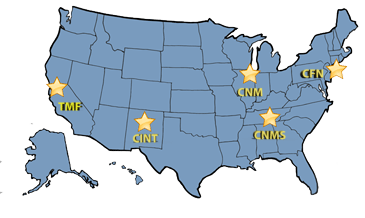Other Nano Resources
Other Nanotechnology User Facilities
NNCI is not the only federally-supported resource for nanotechnology users from academia and industry. The list below includes additional organizations that supplement and complement the NNCI user facilities. Each resource has its own application process, modes of operation, fee structure, and technical scope. These facilities are all operated independently of NNCI and are listed here as a helpful reference.
NIST Center for Nanoscale Science and Technology
 Operated by the National Institute of Standards and Technology (NIST), a component of the Department of Commerce, the Center for Nanoscale Science and Technology (CNST) supports the U.S. nanotechnology enterprise from discovery to production by providing industry, academia, NIST, and other government agencies with access to world-class nanoscale measurement and fabrication methods and technology. The CNST is the only national nanocenter with a focus on commerce. CNST includes a shared-use NanoFab available to external users, as well as in-house nanotechnology research programs.
Operated by the National Institute of Standards and Technology (NIST), a component of the Department of Commerce, the Center for Nanoscale Science and Technology (CNST) supports the U.S. nanotechnology enterprise from discovery to production by providing industry, academia, NIST, and other government agencies with access to world-class nanoscale measurement and fabrication methods and technology. The CNST is the only national nanocenter with a focus on commerce. CNST includes a shared-use NanoFab available to external users, as well as in-house nanotechnology research programs.
The Network for Computational Nanoscience (NCN) at Purdue University
 Supported by the National Science Foundation, NCN provides an infrastructure and research network for computational nanoscience. Extensive resources in support of research and education are delivered through its portal at nanohub.org.
Supported by the National Science Foundation, NCN provides an infrastructure and research network for computational nanoscience. Extensive resources in support of research and education are delivered through its portal at nanohub.org.
Department of Energy Nanotechnology User Facilities
 The U.S. Department of Energy operates five Nanoscale Science Research Centers (NSRCs) which are open to the research community on a peer-reviewed basis. Each NSRC is located at a DOE National Laboratory, providing users with access to many other facilities and additional opportunities for collaboration.
The U.S. Department of Energy operates five Nanoscale Science Research Centers (NSRCs) which are open to the research community on a peer-reviewed basis. Each NSRC is located at a DOE National Laboratory, providing users with access to many other facilities and additional opportunities for collaboration.
The Center for Nanoscale Materials (CNM) at Argonne National Laboratory is a premier user facility, providing expertise, instruments, and infrastructure for interdisciplinary nanoscience and nanotechnology research. Academic, industrial, and international researchers can access the center through its user program for both nonproprietary and proprietary research.
The Center for Nanophase Materials Sciences (CNMS) at Oak Ridge National Laboratory (ORNL) integrates nanoscale science with neutron science; synthesis science; and theory, modeling, and simulation. Operating as a national user facility, the CNMS supports a multidisciplinary environment for research to understand nanoscale materials and phenomena.
The Molecular Foundry (Lawrence Berkeley National Laboratory) is a Department of Energy-funded program providing support to researchers from around the world whose work can benefit from or contribute to nanoscience. Through unparalleled access to state-of-the-art instruments, materials, technical expertise and training, the Foundry provides researchers with the tools to enhance the development and understanding of the synthesis, characterization and theory of nanoscale materials.
The Center for Functional Nanomaterials (CFN) at Brookhaven National Laboratory provides state-of-the-art capabilities for the fabrication and study of nanoscale materials, with an emphasis on atomic-level tailoring to achieve desired properties and functions. The CFN is a science-based user facility, simultaneously developing strong scientific programs while offering broad access to its capabilities and collaboration through an active user program. The overarching scientific theme of the CFN is the development and understanding of nanoscale materials that address the Nations’ challenges in energy security, consistent with the Department of Energy mission.
The Center for Integrated Nanotechnologies (CINT) is a Department of Energy, Basic Energy Sciences Nanoscale Science Research Center jointly operated by Los Alamos National Laboratory and Sandia National Laboratories. CINT’s objective is to foster scientific discovery enabling the integration of nanoscience concepts and structures into the micro and macro worlds. As a National user facility, CINT provides access to its staff and capabilities for nanoscale science research at no fee to approved users for non-proprietary research. Proprietary research may be conducted under a full-cost recovery agreement.
NIH Nanotechnology Characterization Laboratory
![]() The NIH National Cancer Institute's Nanotechnology Characterization Laboratory (NCL) provides knowledge and services to help researchers transition nanomaterials-based cancer treatments from the laboratory into FDA-approved clinical trials. NCI, a component of the National Institutes of Health, established the Nanotechnology Characterization Laboratory to perform pre-clinical efficacy and toxicity testing of nanoparticles intended for cancer therapeutics or diagnostics. Information on participating in the NCL program is available on the NCI Website.
The NIH National Cancer Institute's Nanotechnology Characterization Laboratory (NCL) provides knowledge and services to help researchers transition nanomaterials-based cancer treatments from the laboratory into FDA-approved clinical trials. NCI, a component of the National Institutes of Health, established the Nanotechnology Characterization Laboratory to perform pre-clinical efficacy and toxicity testing of nanoparticles intended for cancer therapeutics or diagnostics. Information on participating in the NCL program is available on the NCI Website.
National Nanomanufacturing Network
![]() The mission of the NNN (supported by the NSF) is to serve as a catalyst for progress in nanomanufacturing in the U.S., through the facilitation and promotion of nanomanufacturing workshops, road mapping, inter-institutional collaborations, technology transition, test beds, and information exchange services. The NNN operates as an open-access network of centers, leaders, experts, and stakeholders from the nanomanufacturing research, development, and education community. It is a partnership between academia, industry and government that is built to foster and serve nanomanufacturing communities of practice. Information on nanomanufacturing processes is distributed through its interNano website.
The mission of the NNN (supported by the NSF) is to serve as a catalyst for progress in nanomanufacturing in the U.S., through the facilitation and promotion of nanomanufacturing workshops, road mapping, inter-institutional collaborations, technology transition, test beds, and information exchange services. The NNN operates as an open-access network of centers, leaders, experts, and stakeholders from the nanomanufacturing research, development, and education community. It is a partnership between academia, industry and government that is built to foster and serve nanomanufacturing communities of practice. Information on nanomanufacturing processes is distributed through its interNano website.
Other Nanofabrication Facilities
Nanotech NYC maintains a list of nanofabrication facilities in the United States. This list is not complete, and not all of these facilities are open to external users.
NNI Research and Development Centers and Networks
In addition to the network of federally-supported user facilities, there has also been significant investment by NNI-participating agencies in the creation of multidisciplinary research and education centers devoted to nanoscale science and engineering. Centers and networks provide opportunities and support for multidisciplinary research among investigators from a variety of disciplines and from different research sectors, including academia, industry and government laboratories.
Full listing of NNI R&D Centers and Networks
Department of Defense (DoD)
Institute for Nanoscience (Naval Research Laboratory)
Institute for Soldier Nanotechnologies (Massachusetts Institute of Technology)
National Institutes of Health National Cancer Institute (NCI)
Alliance for Nanotechnology in Cancer
Centers of Cancer Nanotechnology Excellence (CCNE)
Innovative Research in Cancer Nanotechnology (IRCN)
Cancer Nanotechnology Training Centers (CNTC)
National Institute for Occupational Safety and Health (NIOSH)
Nanotechnology Research Center, Robert A. Taft Lab
Environmental Protection Agency (EPA)/National Science Foundation (NSF)
Center for the Environmental Implications of Nanotechnology (CEINT, Duke University)
University of California Center for Environmental Implications of Nanotechnology (CEIN) at University of California – Los Angeles and University of California – Santa Barbara
US Department of Agriculture (USDA) - Forest Service
Cellulose Nanomaterials Pilot Facilities - Process Development Center/ University of Maine School of Forest Resources and the Advance Structures and Composites Center (Maine)
Forest Service Forest Products Laboratory (Wisconsin)
National Science Foundation (NSF)
Nanoscale Science and Engineering Centers (NSEC)
Nanosystems Engineering Research Centers (NERC)
Science and Technology Centers (STC)
Materials Research Science and Engineering Centers (MRSEC)
Centers of Chemical Innovation (CCI)
International Nanotechnology Organizations
EuroNanoLab
![]() EuroNanoLab is a new distributed research infrastructure consisting of over 40 state-of-the-art academic nanofabrication centers across Europe. Its main vision is to accelerate research in the micro- and nanotechnology sector by enabling the transformation of a fragmented landscape of nanofabrication facilities into an integrated knowledge base supporting scientific excellence and providing researchers a fast-track to results.
EuroNanoLab is a new distributed research infrastructure consisting of over 40 state-of-the-art academic nanofabrication centers across Europe. Its main vision is to accelerate research in the micro- and nanotechnology sector by enabling the transformation of a fragmented landscape of nanofabrication facilities into an integrated knowledge base supporting scientific excellence and providing researchers a fast-track to results.

